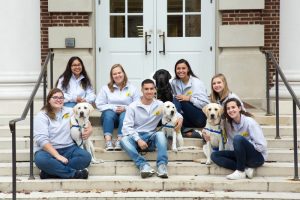The pups are all right
April 13, 2020

“This job teaches you to make the best of any situation,” Schlitzkus said. “And to expect the unexpected. Ridiculous things are bound to happen.”
A senior at the University of Delaware studying pre-veterinary medicine, Schlitzkus is the president of the Canine Companions for Independence (CCI) student group. In other words, she is one of five undergraduates on campus who raise and train future service dogs. With the University now closed due to the coronavirus pandemic and classes happening virtually for the rest of the semester, she and her puppy-raising peers have brought the dogs home. While this presents new training challenges during an already difficult time, the puppy raisers contend the lessons gleaned from their furry charges — expect the unexpected — have allowed them to take this new normal in stride.
For leaders at CCI, a national organization with puppy raisers stationed around the country, the adaptability of the Blue Hen group is not surprising.
“They are the oldest college club in the region, and we consider them the gold standard,” said Debbie Kantz, puppy program manager for CCI’s Northeast region, which extends from Maine to Virginia. “We point to the UD group when other colleges are interested in setting up a club, because they are fantastic at organizing and coordinating their volunteers.”
Typically, UD’s puppy raisers live with their dogs in specially designated campus housing or in dog-friendly apartments just off campus. In order to socialize the animals, they bring them along when exploring the community, hanging out on the UD Green, even attending class. The puppy raisers also take part in CCI chapter meetings around the Philadelphia region as well as weekly group meetings on campus. At these sessions, handlers learn strategies for teaching 30 commands to dogs between the ages of eight weeks and 18-to-24 months. From there, the puppies graduate to advanced training with professionals from CCI, who prepare the canines for their respective jobs. Some will be matched to veterans suffering with PTSD; others will provide companionship in hospitals, occupational therapy clinics or other facilities; and still others will assist members of the disabled community.
But, with the spread of COVID-19, puppy raisers have been forced to pivot. Now, they are training their animals from quarantined homes in separate states, relying on virtual resources like Skype training sessions and one-one-one conferences organized by CCI headquarters. They are also staying connected — and sharing coping strategies.
“Making sure the dogs are getting real-world experience is difficult,” said Makayla Musgrove, a pre-veterinary medicine major living in Delmar, Delaware. Her puppy, Malfoy, is a “very floppy” five-month-old labrador/golden-retriever cross. “It is important he learns to be quiet and not approach random people in public spaces, and he needs to adhere to commands in a variety of environments. That’s difficult to achieve when nothing is open.”
To adapt, Musgrove has made a point of taking her dog on (socially distanced) walks past the construction work happening in her development, which allows Malfoy at least some opportunity for so-called “distraction training,” or learning to ignore potential diversions.
Other puppy raisers are utilizing the built-in training resources they have at home — namely, their other dogs.
“My family has two — a golden retriever and a husky,” said Lauren Zablo, a junior living in Woodcliff Lake, New Jersey, and working toward a degree in human services. “So this is an ideal time to teach my puppy, Kalar, that he is different than a typical pet — he does not have the same privileges as they do. For example, he is not allowed on furniture. And he is not allowed to eat human food.”
No worries, Zablo added. This tough-love lesson hasn’t bred any resentment in Kalar. He is still ultra-protective of the family’s 11-year-old golden retriever — he checks in on her frequently and nightly walks her up the stairs to bed.
Another challenge of at-home training is lack of help. Typically, the puppy raisers have access to more than 100 puppy sitters, fellow UD undergraduates who volunteer to watch the dogs when their handlers need to leave them alone. This helps keep the animals from getting too attached to one person. Without these sitters, parents have stepped in to assist. Of course, this solution presents its own difficulties.
“My dad is the fun person, and I’m the one with all the rules,” said Schlitzkus, now raising a new puppy after Walter, the rogue pooper, graduated to advanced training. “And my dog definitely takes advantage of that. She’ll dig holes in the backyard, and then give me a look like: It wasn’t me! I can see the dirt on her paws, but then she wags her tail and it is so hard to be mad.”
For every advantage of training under lockdown — it is easier to establish a routine under quarantine, for example — there is a potential drawback to navigate. For instance, the home environment is typically quieter than the college one, so puppy raisers have to work extra hard to acclimate their dogs to noise. Some have taken to dropping cups and other items on the kitchen floor from time to time, to ensure the pups don’t spook too easily.
No matter the setbacks, the CCI dogs work daily to improve. For some people — especially during a trying time in the nation’s history — this has been a source of inspiration. When the puppy raisers are tempted to, say, skip an online class in favor of sleeping in and shutting out the world, they find motivation in their cute and curious companions.
“Every morning, my puppy wakes up and does his best,” Zablo said. “And some day, he’ll drastically change someone’s life for the better. So I have to do my part, too. I need to get up, get out of bed and get this day started. We’re a team, and we do everything together. We’ll get through this together, too — one day at a time.”
Register your Dog Schedule a Visit

 When middle school students return to class on Jan. 11, they’ll find a new face at the door: Daisy. Daisy is a therapy dog and the personal pet of Rob Kreger, principal of the Rock L. Butler Middle School. The five-year-old golden retriever is not a school pet or mascot, but rather a working dog […]
When middle school students return to class on Jan. 11, they’ll find a new face at the door: Daisy. Daisy is a therapy dog and the personal pet of Rob Kreger, principal of the Rock L. Butler Middle School. The five-year-old golden retriever is not a school pet or mascot, but rather a working dog […] Last March, Caroline Benzel, a third-year medical student, began to notice the stress and discomfort her nurse friends were feeling from the pressures of the ongoing Covid-19 pandemic. “[Personal protective equipment] can be really rough on the skin,” Benzel, 31, tells PEOPLE. Benzel and her 3-year-old Rottweiler, Loki (who’s also a therapy dog) hatched a […]
Last March, Caroline Benzel, a third-year medical student, began to notice the stress and discomfort her nurse friends were feeling from the pressures of the ongoing Covid-19 pandemic. “[Personal protective equipment] can be really rough on the skin,” Benzel, 31, tells PEOPLE. Benzel and her 3-year-old Rottweiler, Loki (who’s also a therapy dog) hatched a […] When Stanley the miniature fox terrier’s owner passed away, the little dog started a ‘paw-some’ new role – bringing puppy love to some of the Gold Coast’s oldest residents. After Carinity Cedarbrook Diversional Therapist Julianne Staff adopted Stanley, he began visiting the aged care community at Mudgeeraba as a therapy dog. Therapy dogs help to […]
When Stanley the miniature fox terrier’s owner passed away, the little dog started a ‘paw-some’ new role – bringing puppy love to some of the Gold Coast’s oldest residents. After Carinity Cedarbrook Diversional Therapist Julianne Staff adopted Stanley, he began visiting the aged care community at Mudgeeraba as a therapy dog. Therapy dogs help to […] Those who own a dog can attest to their ability to lift mood, improve stress and bring joy by simply being there, unanswering, seemingly all-knowing and always delighted to see you. Therapy animals are known for their calm and comforting nature, giving people a way to relax, de-stress and interact with a loving pet. They […]
Those who own a dog can attest to their ability to lift mood, improve stress and bring joy by simply being there, unanswering, seemingly all-knowing and always delighted to see you. Therapy animals are known for their calm and comforting nature, giving people a way to relax, de-stress and interact with a loving pet. They […] For those of us with dogs, we know they quickly become major parts of the family. You live for and care for just like one of your own children, and one dog right here in Oklahoma City is beating the odds, and helping others recover as a therapy dog, despite all of the issues he’s […]
For those of us with dogs, we know they quickly become major parts of the family. You live for and care for just like one of your own children, and one dog right here in Oklahoma City is beating the odds, and helping others recover as a therapy dog, despite all of the issues he’s […] Cherokee Middle School students may do a little more “doodling” second semester starting this month (January), but also will improve their attendance marks because of a special attraction at the school, courtesy of Principal Scott Aden. Aden, an effective, caring administrator, has acquired and will house and handle a young female Golden Doodle (Charlie) that […]
Cherokee Middle School students may do a little more “doodling” second semester starting this month (January), but also will improve their attendance marks because of a special attraction at the school, courtesy of Principal Scott Aden. Aden, an effective, caring administrator, has acquired and will house and handle a young female Golden Doodle (Charlie) that […] E5 Therapy opened in April with a different way to help veterans in therapy. They offer canine-assisted therapy along with talk therapy to veterans and veterans’ families in Solano County. Owner Matthew Decker is a licensed clinical social worker in Northern California, focused on helping veterans achieve their mental health goals. Along with his team, […]
E5 Therapy opened in April with a different way to help veterans in therapy. They offer canine-assisted therapy along with talk therapy to veterans and veterans’ families in Solano County. Owner Matthew Decker is a licensed clinical social worker in Northern California, focused on helping veterans achieve their mental health goals. Along with his team, […]